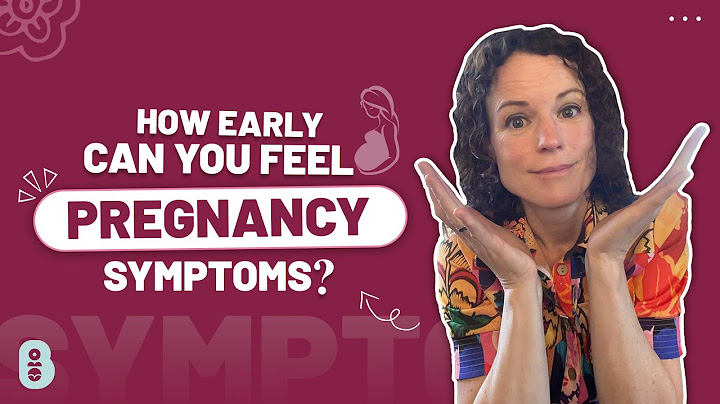We include products we think are useful for our readers. If you buy through links on this page, we may earn a small commission. Here’s our process. Show Some women have no pregnancy symptoms at week 1, while others may experience symptoms such as fatigue, breast tenderness, and mild cramping. Typically, medical professionals measure pregnancy week 1 from the first day of a woman’s last menstrual period. Although a woman is not actually pregnant at this point, counting week 1 from the last menstrual period can help determine a woman’s estimated pregnancy due date. However, this article will refer to pregnancy week 1 as starting a week after conception, meaning the literal first week of pregnancy. A missed menstrual period is often the primary symptom of early pregnancy. Conception, or fertilization, occurs when the ovary releases an egg (ovulation), and a sperm fertilizes it. This can happen about 14 days after the menstrual cycle starts, according to March of Dimes. According to Planned Parenthood, implantation begins about 6–7 days after conception. This is when the fertilized egg attaches to the lining of the uterus. This movement of the egg may break down blood vessels within the uterus wall, which may cause light bleeding and cramping. BleedingImplantation bleeding is an early sign of pregnancy. It is not like a menstrual period. Instead, it is light bleeding that may involve a single spot of blood or a small amount of pink discharge. The spotting may last for a few hours, or it may last for a few days. CrampingWomen may also feel mild cramping as the embryo attaches to the uterus wall. Women may feel these cramps in the abdomen, pelvis, or low back area. The cramping may feel like a pulling, tingling, or pricking sensation. Some women experience only a few minor cramps, while others may feel occasional discomfort that comes and goes over a few days. Pregnancy symptoms in week 1 are different for every woman and every pregnancy. According to the Office on Women’s Health, the most common first sign of pregnancy is a missed menstrual period. Other early pregnancy symptoms include:
Not all of these symptoms are unique to pregnancy. It is also important to note that early pregnancy does not always cause noticeable symptoms. The best way for a person to find out if they are pregnant is to take a pregnancy test. A pregnancy test measures the amount of Human Chorionic Gonadotropin (hCG) hormone in the urine. This hormone is only present when a woman is pregnant. As the egg grows into an embryo, the cells that surround it and later become the placenta produce hCG. Planned Parenthood indicate that it is best to take a pregnancy test as soon after a missed period as possible. A pregnancy test may return a positive result as early as 10 days after a person has had sex without contraception. However, it typically takes about 3 weeks before there’s enough hCG in the urine to produce a positive pregnancy test. There are many affordable and reliable pregnancy tests available over-the-counter (OTC) or online. A home pregnancy test can tell whether you are pregnant in a few minutes, with most claiming to offer almost 99% accuracy. To help ensure an accurate result, the best time to take a pregnancy test is 1 week after a missed period. Results of a pregnancy test are either positive or negative. If a woman takes the pregnancy test earlier than 1 week after a missed period, it may give a negative result, even if the person is actually pregnant. If a person believes they are pregnant despite a negative test result, they should repeat the test after 1 week. To avoid a false negative result, check the pregnancy test’s expiration date, and carefully follow the written directions. A person can also have a blood test to determine whether they are pregnant. This test identifies the presence of hCG in the blood. The blood test can show a positive result a few days earlier than the urine test can, but it may take up to 48 hrs to get the results back from the lab. Pregnancy symptoms are different for every woman. Some women may notice symptoms, such as spotting or a headache, during week 1 of pregnancy. Others may only experience a missed period. Some women will have no symptoms at all. Whether a person has symptoms or not, the best way to determine if they are pregnant is to take a pregnancy test. A range of pregnancy tests is available for purchase online. Can you get pregnancy symptoms 2 weeks before your period is due?Morning sickness is notoriously incorrectly named. As most pregnant women can tell you, it can happen at any time. It is also a common early sign of pregnancy before you miss your period. A few weeks after conception, your body produces more estrogen and progesterone, causing nausea or vomiting.
What are the early signs of pregnancy before two weeks?Some early symptoms you might notice by week 2 that indicate you're pregnant include:. a missed period.. moodiness.. tender and swollen breasts.. nausea or vomiting.. increased urination.. fatigue.. |

Related Posts
Advertising
LATEST NEWS
Advertising
Populer
Advertising
About

Copyright © 2024 en.idkuu.com Inc.


















